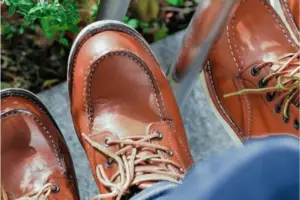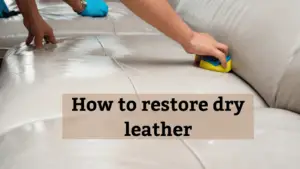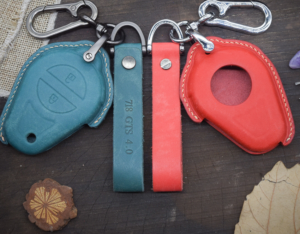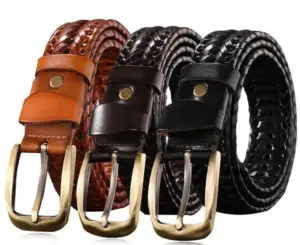How to use Boiled Linseed Oil on Leather
When it comes to caring for leather, there are a variety of products that can be used. So far, we’ve looked at the pros and cons of using mink oil, saddle soap, and olive oil on leather.
Another popular option is linseed oil, which has been used for centuries as a natural treatment for leather. But can you use boiled linseed oil on leather or are there potential drawbacks to using this method?
This is what we will look at in this article. We’ll take a closer look at the unique properties of boiled linseed oil and how it can benefit leather as well as some potential risks and cons to consider.
We’ll also discuss how to apply boiled linseed oil to leather properly and share some tips and best practices to ensure that you achieve the best results.

Can you use boiled linseed oil on leather?
Yes, you can use boiled linseed oil on leather to moisturize it. When used carefully, linseed oil penetrates the surface of the leather and creates a protective layer that helps to prevent cracking, splitting, and other forms of leather damage.
Reasons why boiled linseed oil is good for leather
1. Protects leather from damage
One of the primary benefits of using boiled linseed oil is that it protects the leather from damage.
Boiled linseed oil creates a natural protective coating on the surface of leather that helps to repel water and prevent damage from moisture. This is particularly important for leather items that are used outdoors or in damp environments.
Additionally, the protective coating shields the leather from scratches, stains, and other types of wear and tear that can occur over time.
2. Improves flexibility and softness
Boiled linseed oil can indeed help to improve the flexibility and softness of the leather, which can make it more comfortable to wear and use.
This is due to its high moisturizing and hydrating abilities that ensure the leather remains supple preventing it from becoming stiff and brittle over time.
This can be especially important for leather items that see a lot of wear and tear, such as shoes, belts, jackets, or gloves.
3. Increases the durability of leather
Conditioning your leather items regularly using boiled linseed oil helps to strengthen and protect the leather making it more resistant to wear and tear.
This can help your leather goods last longer and withstand heavy use.
Also, if you have an older leather item that has started to show signs of aging, oiling with linseed oil is a great way to restore it to its former glory as it rejuvenates the leather making it look and feel newer and fresher.
4. Enhances the natural beauty of leather
Another benefit of using boiled linseed oil is that it can help to enhance the natural beauty of the material.
The oil can bring out the natural grain and texture of the leather adding depth and dimension to the material.
Additionally, boiled linseed oil can help to deepen the color of the leather giving it a rich and luxurious look.
This can be especially helpful for leather items that have become faded or worn over time, as the oil can help to restore their original luster and shine.
5. Provides a natural treatment option
Furthermore, boiled linseed oil is a natural product that can provide a safe and effective treatment option for leather goods.
Unlike some synthetic treatments that can contain harsh chemicals or additives, boiled linseed oil is a simple, natural solution that can help to nourish and protect leather without causing any harm.
Thus, it’s good for people with sensitive skin or allergies as well as those who are concerned about using eco-friendly and sustainable products.
Will linseed harm leather items?
Boiled linseed oil is treated with chemicals that help it dry more quickly, which makes it a better option for use on leather.
The boiling process also helps to remove impurities from the oil, making it less likely to cause damage or discoloration.
In contrast, pure linseed oil is not recommended for use on leather as it takes a long time to dry. So if applied directly to the leather, it can seep into the pores of the material and cause it to become gummy or sticky.
However, it is still important to use boiled linseed oil sparingly and in moderation as too much oil can cause the leather to become oversaturated and weaken the fibers over time.
Additionally, boiled linseed oil may darken the color of the leather and cause materials like suede and Nubuck to become slick and greasy.
How to treat the leather with boiled linseed oil properly (step by step)
Step 1: Clean the leather
Before you begin, make sure your leather item is clean and free of any dirt or debris.
Use a soft-bristled brush or a clean damp cloth to gently remove any dirt or dust from the surface of the leather.
Step 2: Apply the oil
Using a clean dry cloth, apply a small amount of boiled linseed oil to the surface of the leather, working in circular motions.
Make sure to apply the oil evenly and avoid using too much as this can cause the leather to become oversaturated.
Some people tend to mix linseed oil with vinegar, but it is not recommended. This is because despite both products being natural, they can cause a reaction that can damage or discolor the leather when combined.
Instead, it is advisable to use linseed oil and vinegar separately. Vinegar is a good leather cleaner when mixed with water while boiled linseed oil is a good leather conditioner.
Step 3: Air dry the leather
Allow the boiled linseed oil to dry completely before using or storing the leather item. This may take several hours, depending on the climate and humidity.
Step 4: Buff the leather
Once the oil has dried, use a clean dry cloth to buff the leather so as to remove any excess oil and bring out the natural shine of the material.
In conclusion, boiled linseed oil can be a great natural option for treating and conditioning leather goods.
Not only does it provide a protective layer that can help to prevent damage and wear, but it can also enhance the natural beauty of the material and keep it flexible and soft for years to come.
However, it’s important to use boiled linseed oil is not good for suede or Nubuck as it might cause darkening.
Always test a small area of the leather before applying the oil to the entire surface and make sure to avoid using too much as this can oversaturate the material and cause it to weaken over time.




